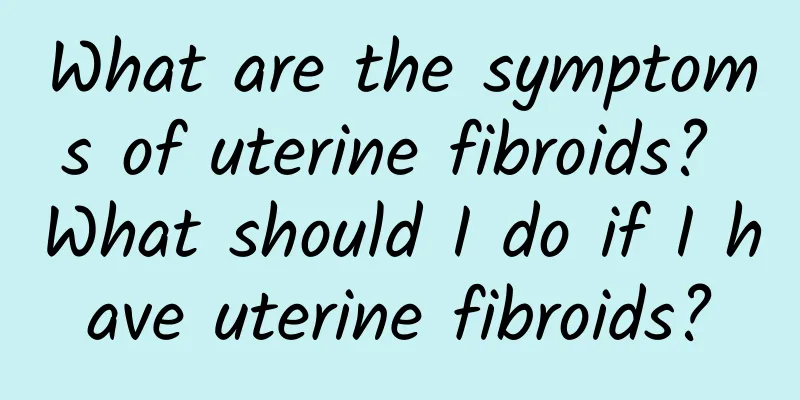What are the symptoms of uterine fibroids? What should I do if I have uterine fibroids?

|
Uterine fibroids are one of the most common benign tumors in the female reproductive organs and one of the most common tumors in the human body. They are also called fibroids and uterine fibroids. Because uterine fibroids are mainly composed of the proliferation of uterine smooth muscle cells and a small amount of fibrous connective tissue exists as supporting tissue, they are more accurately called uterine leiomyoma. Uterine fibroids. Symptoms of uterine fibroids: Pain-Common pains of uterine fibroids are lower abdominal swelling, back pain, etc. In some special cases, acute pain may occur, such as torsion of pedunculated fibroids, or red degeneration during pregnancy, which may be accompanied by fever. Frequent urination and urgency - When the fibroid grows forward or backward, it will compress the bladder, urethra or rectum, causing frequent urination, dysuria, urinary retention or constipation. When the fibroid grows on both sides, it will form a broad ligament fibroid, compressing the ureter or hydronephrosis; if it compresses the pelvic blood vessels and lymphatic vessels, it will cause lower limb edema. Irregular menstruation is one of the symptoms of uterine fibroids. Due to the increase in the area of the endometrium and the influence of estrogen on endometrial hyperplasia, fibroids hinder uterine contraction, affect blood circulation, and cause endometrial congestion, which manifests as increased menstruation, prolonged menstruation, or irregular vaginal bleeding. Causes infertility and miscarriage - The symptoms of uterine fibroids affect pregnancy and delivery. Subserosal fibroids generally do not affect pregnancy, while endometrial hyperplasia can cause infertility. If pregnancy is possible, miscarriage and premature birth may occur sometimes due to insufficient blood supply or uterine stenosis. When the pregnancy is full-term, uterine deformation can hinder uterine contractions, cause dystocia and postpartum hemorrhage. |
<<: What are the symptoms of uterine fibroids? What discomfort will uterine fibroids cause?
>>: What should I do if I have uterine fibroids? Let me show you the symptoms of uterine fibroids
Recommend
What is the flow process like?
Some women get pregnant unexpectedly and do not w...
How to treat recurrent vaginal candidal infection
How to treat recurrent vaginal candidal infection...
Medical treatments for uterine effusion include
The best treatment for hydrometra is antibiotics,...
How much does it cost to treat cervical warts?
Speaking of cervical warts, I think everyone know...
Is it good to cool down by eating a big bowl of sashimi? Fear of stepping on the heat mine
A bowl full of sashimi rice with a variety of sea...
What drugs have an effect on uterine fibroids? What drugs are helpful for uterine fibroids?
What drugs have an effect on uterine fibroids? Wh...
How much does it cost to see a doctor for pelvic peritonitis?
Pelvic inflammatory disease is a common gynecolog...
What are the symptoms of cervical erosion?
The symptoms of different degrees of cervical ero...
Push-ups also have a female version with a coach's amazing demonstration
Who says girls don’t have the strength to do push...
Beware of pelvic inflammatory disease if you lack exercise for a long time
The main symptoms of pelvic inflammatory disease ...
Get rid of the belly fat! Scissor kick exercise is a must after giving birth
On the road to losing weight, everyone has experi...
The cause of vulvar leukoplakia is unknown, but there is some knowledge that patients need to know
If women do not pay attention to personal hygiene...
Are there any sequelae of uterine fibroids? Will they turn into cancer?
Uterine fibroids are generally benign tumors and ...
What are the classifications of uterine prolapse?
What are the classifications of uterine prolapse?...
Experts tell you the causes of adnexitis
Adnexitis is a common gynecological disease in wo...









